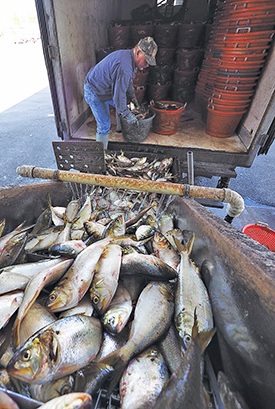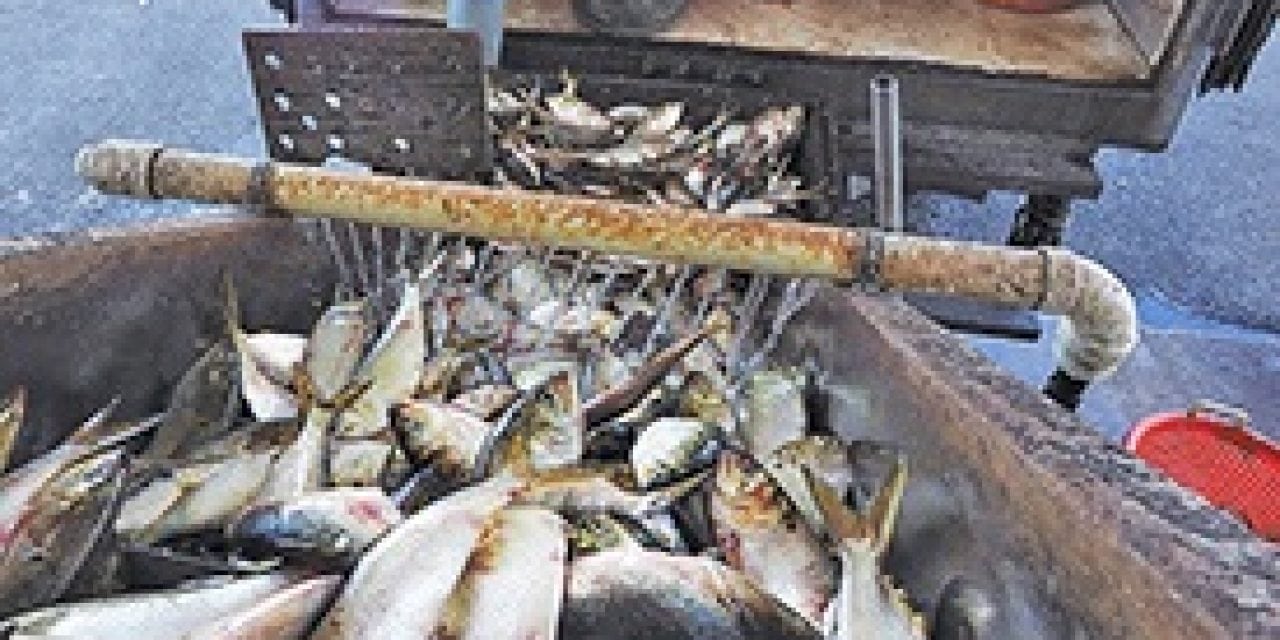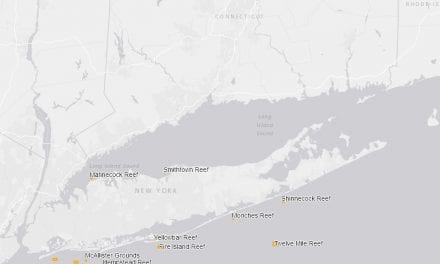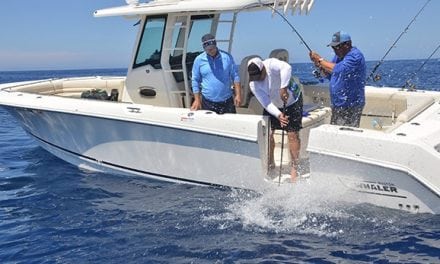 East Coast fishery managers have decided to give Virginia until next year to adopt regulations that limit catches of menhaden in the Chesapeake Bay rather than seek an immediate moratorium on harvests.
East Coast fishery managers have decided to give Virginia until next year to adopt regulations that limit catches of menhaden in the Chesapeake Bay rather than seek an immediate moratorium on harvests.
Conservation groups and the fishing industry have been engaged in a long-running battle over how many menhaden can be caught without ecological consequences.
Humans don’t eat menhaden, but the small, oily fish are a critical food for a host of marine life from whales to striped bass. While the overall stock is considered healthy, conservationists have argued that such evaluations do not account for its role as forage for fish, birds and marine mammals.
Last fall, forage fish advocates persuaded the Atlantic States Marine Fisheries Commission to slash the maximum allowable harvest in the Bay — where much of the East Coast harvest takes place — from 87,216 metric tons to 51,000 metric tons a year, even as it increased the total allowable coastwide catch.
But the action angered Omega Protein, which operates a facility in Reedville, VA, that “reduces” large amounts of menhaden caught by its fishing fleet into other products, such as fish oil supplements and animal feed. Omega is by far the largest harvester of menhaden in the Chesapeake and the entire East Coast. The company has not exceeded the new limit for Bay waters in years because it has drawn more of its catch from the Atlantic, but officials said the lower number restricts their future options and has no scientific basis.
States are required to adopt harvest limits set by the ASMFC. But in Virginia, where the General Assembly sets menhaden regulations, Omega opposed the change, and the legislation was not brought to a vote.
In May, the ASMFC’s menhaden board considered acting against Virginia, but decided to give the state more time to come into compliance.
That didn’t happen, though. In a June letter to the commission, Virginia Gov. Ralph Northam said that he and his staff sought to get lawmakers to adopt the new regulations, but “unfortunately, we were not successful.”
The governor said he remained “hopeful” he would ultimately resolve the issue with the General Assembly and asked the commission to not formally find the state out of compliance unless it actually exceeds the new catch limits, which seems unlikely.
At their August meeting, members of the commission’s menhaden board struggled over whether to take
action — and whether the federal government would back it up if they did.
Bob Ballou, of the Rhode Island Department of Fish and Wildlife, said failure to act could set a precedent of allowing a state to not enact the commission’s regulations, instead saying “trust us, we’re not going to go over.”
“I worry that it tears at the fabric of what this commission has always been about,” he said. “We take, for better or for worse, what this board adopts, and then we implement it. If we don’t or we can’t, there needs to be some level of accountability.”
On the other hand, Jim Gilmore, director of the New York Division of Marine Resources, said the Virginia situation was only a “technical noncompliance” because Omega’s menhaden harvests in the Bay appeared likely to stay within the commission-approved limit.
“I know it is not following our process, but when you start looking at all those other factors, folding in noncompliance at this point in time may do more damage than it is going to do good,” he said.
Several members argued that Virginia was getting a break because the commission was worried that the U.S. Department of Commerce would not back up its decision.
If the commission finds a state failed to comply with its actions, it sends a recommendation to the Department of Commerce requesting that it impose a moratorium on all catches of that species within the offending state.
That’s happened about two-dozen times since 1993 when Congress gave the Commerce secretary the power to enforce the commission’s actions.
But last year, for the first time, Secretary Wilbur Ross rejected a request by the commission to find New Jersey out of compliance for its failure to adopt a new catch limit for summer flounder, a move many viewed as political.
“If all of us believed that our action here would be supported by the secretary of Commerce there would not be a discussion around the table right now,” said Andy Shiels, a commission member from the Pennsylvania Fish and Boat Commission.
Shiels said if the commission did not exert its authority, “at some point there is not going to be an Atlantic States Marine Fisheries Commission with the ability to make decisions about how fisheries are managed up and down the East Coast.”
Winning support from the Commerce Department could be an issue. Chip Lynch, an attorney with the National Marine Fisheries Service — which is part of the department — told board members that the law requires the federal review to focus on the conservation of the fishery and whether any noncompliance jeopardizes the stock.
He said the commission’s own data raised questions about whether menhaden are in jeopardy. The ASMFC’s latest review found that menhaden are not overfished, and the commission itself agreed last fall to increase the coastwide catch by 8 percent.
“This would be the first time ever,” Lynch said, “that the federal government would receive a noncompliance referral for a fishery that is not overfished, [and where] overfishing is not occurring.”
Recreational fishermen and conservation groups have long argued that the Bay is an important nursery area for menhaden, and they contend that the species may suffer “localized depletion” because of heavy fishing pressure and therefore warrants extra protection.
But the management plan the ASMFC adopted last year stated there was little evidence to support that concern. It noted that a multi-year research program found that menhaden are highly mobile and local depletion would occur only on a “relatively small scale for a relatively short time.” Nonetheless, the commission has supported a cap on Omega’s catch in the Bay since 2005, saying it “does provide a greater level of protection.”
Ultimately, members of the menhaden board voted to table the issue of Virginia’s compliance until next year, giving the General Assembly another chance to act.
After the meeting, environmental groups criticized Omega for working against the adoption of the lower limits. “Omega Protein continues to undertake a risky gamble with the health of the Bay’s menhaden population, undermining ASMFC’s efforts to ensure vibrant fish populations and healthy fisheries all along the Atlantic Coast,” said Chris Moore, regional ecosystem scientist for the Chesapeake Bay Foundation.
Omega, meanwhile, said it believed the extra time granted by the menhaden board would allow time for it to work with the state and other stakeholders to find an “equitable solution” for the Bay and that, in the meantime, menhaden were being sustainable managed.
Omega spokesman Ben Landry said “there is nothing in the current operations of the menhaden fishery that would justify a noncompliance finding.”
The post VA Has Menhaden Limits or Face Moratorium appeared first on .

















